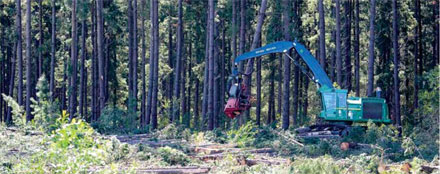The Federal Government has removed the controversial “water rule” from the Australian Carbon Credit Unit scheme. The water rule – with its complex exceptions – has been an ad-hoc and ineffective way of managing water resources. Source: Timberbiz
The Australian Government is addressing this holistically, in partnership with states and territories, as part of the renewal of the National Water Initiative.
The rule prevented plantation and farm forestry projects from access to the carbon market, held up much-needed investment in new plantations, and disincentivised replanting trees sending the total estate into decline.
Removing the “water rule” creates certainty for forestry to better contribute to emissions reduction through increased participation in carbon farming and investment in new timber plantations.
“The removal of these restrictions nationally is great news because Australia desperately needs new production tree plantings to grow future timber and wood fibre supply. Today, the Government has delivered for industry by removing these barriers to carbon markets,” Australian Forest Products Association CEO Joel Fitzgibbon said.
Australia needs one billion new production trees planted by 2030 to secure Australia’s future timber and fibre supply for everything from house frames to packaging and paper products.
Furthermore, AFPA-Master Builders Australia analysis highlighted that Australia will be 250,000 new house-frames short of demand by 2050 if Australia’s doesn’t achieve the billion new trees by 2030 goal. That’s cities the size of Newcastle and Geelong combined. Australia has the golden opportunity to ready itself for insatiable international demand for sustainably sourced wood and fibre, with global demand forecast to quadruple by 2050.
The amendment clears the way for planting up to 100 million trees Australia-wide by 2030.
“The forest products sector thanks the Government for its delivery of this key commitment. AFPA will continue to work with Minister Watt and other Government Ministers on fibre security strategies which build sovereign capability while helping Australia realise its decarbonisation ambitions,” Mr Fitzgibbon said.
Plantations and farm forestry plantings store carbon, enabling growers to participate in the ACCU scheme to generate carbon credits and earn additional income from selling these credits.
These credits are certified through the Clean Energy Regulator for compliance with the detailed requirements in ACCU scheme methods and rules to ensure they have integrity.
Applications to register new plantations and tree planting projects in the ACCU scheme with a start date after 1 June 2024 will now be assessed without being subject to the water rule.
The government has also approved four additional regions where tree planting projects can meet the water rule before its removal. They cover Regional Forestry Hubs in south and Central Queensland, North Queensland, the Northern Territory and Ord Valley, and southeast New South Wales.
These newly approved regions are in addition to existing regions in Western Australia, Tasmania, New South Wales, Victoria and South Australia.
Timber Queensland CEO Mick Stephens said that the lifting of this unnecessary barrier will help to promote new plantations on farms in Queensland for multiple benefits.
“Queensland was a big loser from the existing barrier which effectively blocked the ability for farmers and landowners to access carbon credits for new plantations in areas that received over 600 mm annual rainfall. We do get lots of rain in many parts of Queensland which can support carbon farming with wood production,” Mr Stephens said.
“As an industry we have worked tirelessly to get this barrier removed so that plantation and farm forestry can compete on a level playing field with other land-based carbon farming activities under the scheme.
“It is disappointing it has taken many years to get this issue resolved under successive Governments, but when it comes to public policy, we take the view that common sense will ultimately prevail.”
The Victorian Forest Products Association said the decision was a win for forestry and the environment, and importantly, the decision would improve Australia’s sovereign timber capability. The amendment clears the way for planting up to 100 million trees Australia-wide by 2030.
The South Australian Forest Products Association has been in discussions with the South Australian Government about the importance of seeking the early removing the ‘water rule’, as access to the carbon market will incentivise investment in South Australia’s plantation and farm forestry estate which will lead to more trees in the ground to help meet our future fibre needs whilst at the same time helping the South Australian Government achieve its net zero targets.
“The removal of this red tape barrier is great news because it will help us get more trees in the ground which will help us meet the fibre needs of the community tomorrow. COVID-19 showed us the importance of sovereign capability in fibre supply and today’s announcement by the Federal Government is a step forward in making that happen,” SAFPA CEO Nathan Paine said.
To further support new carbon farming projects and Australia’s forestry industry, the Government is also providing $73.8 million in grant funding to support the establishment of new plantation forests.
The grant funding supports the establishment of new long-rotation softwood and hardwood plantations to help expand Australian timber supply, contribute to carbon reduction, and create regional jobs.
“New long-rotation softwood and hardwood plantations will help Australia meet future demand for timber, while ensuring a sustainable and prosperous future for the forestry industry,” the Minister for Agriculture, Fisheries and Forestry Senator Murray Watt said.
“The removal of the water rule demonstrates the Government’s ongoing commitment to support the plantation forestry industry.
“The plantation forestry industry is a big employer in regional areas, and this move will encourage industry to take a bigger role in helping Australia bring down emissions whilst also providing an important resource.”







